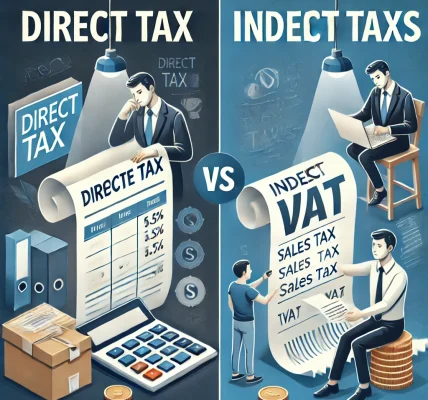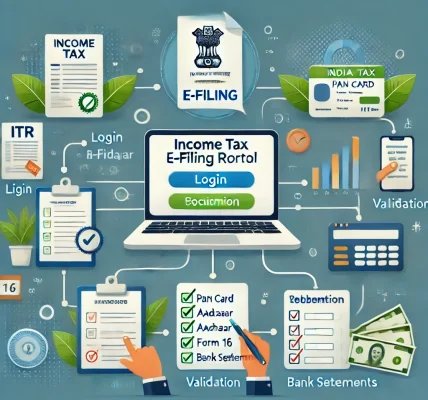Tax evasion is the illegal practice of deliberately avoiding paying taxes owed to the government. While it may seem like a way to reduce financial burdens in the short term, the consequences of tax evasion can be severe and far-reaching. In India, the government takes tax evasion very seriously, and individuals and businesses caught evading taxes can face hefty fines, interest charges, and even imprisonment.
This blog post will explain the legal consequences of tax evasion in India, the penalties associated with it, and practical steps you can take to avoid falling into legal trouble. Understanding tax laws and ensuring full compliance is not only necessary to avoid legal complications but also to contribute to the nation’s economic development.
What is Tax Evasion?
Tax evasion involves illegally reducing or avoiding tax payments by falsifying documents, underreporting income, inflating expenses, or hiding money. It is a willful attempt to avoid paying taxes that are legally due. Common forms of tax evasion include:
- Underreporting income: Not reporting all earnings or income sources.
- Inflating deductions: Claiming expenses or deductions that are not legitimate or are exaggerated.
- Hiding assets: Concealing income or assets in offshore accounts or using complex financial structures.
- Fake invoices: Issuing false invoices to reduce taxable income.
Tax evasion is different from tax avoidance, which involves legal strategies to minimize tax liability by taking advantage of tax exemptions and deductions allowed by law.
Legal Consequences of Tax Evasion in India
The Indian government, through the Income Tax Department, takes tax evasion seriously. There are strict laws in place to ensure tax compliance, and those caught evading taxes face severe penalties. Here are the key legal consequences of tax evasion:
1. Penalties for Tax Evasion
Under the Income Tax Act, 1961, tax evasion can result in significant financial penalties. These penalties depend on the severity of the tax evasion and whether the individual or business is found guilty of fraudulent activities.
- Penalties for Underreporting Income: If an individual or business underreports income or submits false statements, the penalty can range from 50% to 200% of the tax that was evaded.
- Penalty for Concealment of Income: If it is determined that income was concealed intentionally, a penalty of up to 300% of the evaded tax may be imposed.
- Penalty for Failure to File Returns: If a person fails to file their income tax return within the prescribed time, they are liable for a late filing fee of ₹1,000 to ₹10,000, depending on the delay. This is in addition to any penalties for underreporting or evasion.
2. Interest on Unpaid Taxes
In addition to penalties, individuals and businesses caught evading taxes must pay interest on the unpaid taxes. The interest rate is typically 1% per month for the period of delay. This interest is calculated from the due date of the tax until the date of payment.
- Simple Interest: For the first year of delay, interest is charged at 12% per annum for taxes that are due but not paid.
- Excessive Delays: If tax evasion continues for an extended period, the interest charged may increase.
3. Prosecution and Imprisonment
In the most severe cases of tax evasion, where fraud, willful concealment, or large-scale evasion is involved, prosecution and imprisonment may be imposed. Individuals found guilty of deliberately evading taxes can face criminal prosecution under the Income Tax Act.
- Imprisonment: The penalty can include imprisonment for a term ranging from 6 months to 7 years depending on the amount of tax evaded and the nature of the fraud.
- For Serious Offenses: In extreme cases involving large sums of money or continued evasion despite warnings, the individual may face a combination of a fine and imprisonment.
4. Seizure of Property and Assets
The Income Tax Department has the authority to seize assets and properties in cases of significant tax evasion. This can include:
- Bank accounts, vehicles, or property ownerships linked to the evader.
- Seizure of cash and valuables related to the evasion.
These actions are part of the government’s efforts to recover unpaid taxes, penalties, and interest.
How to Avoid Tax Evasion and Penalties
Avoiding tax evasion and staying compliant with the Income Tax Act is essential for businesses and individuals to avoid legal consequences. Below are key steps to ensure that you comply with tax laws and avoid any penalties:
1. Maintain Accurate Records
One of the most important steps to avoid tax evasion is maintaining accurate financial records. Ensure that all income, expenses, and financial transactions are well-documented and traceable. This includes:
- Keeping receipts for all business-related purchases.
- Properly recording income from all sources.
- Maintaining digital or physical copies of contracts, invoices, and financial statements.
Good record-keeping makes it easier to file accurate tax returns and reduces the risk of mistakes or fraudulent activities.
2. File Your Tax Returns on Time
Filing your tax returns on time is one of the simplest ways to avoid penalties. Ensure that you are aware of the deadlines for filing income tax returns and make sure to submit your returns before the due date.
If you are unable to file on time, consider applying for an extension (if eligible) or seek professional help to avoid penalties for late filing.
3. Report All Sources of Income
Tax evasion often involves the concealment of income. It is essential to report all sources of income accurately, including income from salaries, business profits, interest, investments, and even side income. Ensure that you are transparent about your earnings to avoid penalties for underreporting.
4. Claim Legitimate Deductions
Taxpayers are allowed to claim deductions on various expenses under sections like 80C, 80D, and 80G. However, it is essential to claim only the deductions you are legitimately entitled to and avoid inflating expenses or creating false claims. Be cautious about the deductions you claim, as falsely claimed deductions can lead to severe penalties.
5. Seek Professional Help
Tax laws can be complex, and it is often beneficial to seek help from a certified tax consultant or financial advisor. A professional can guide you in tax planning, filing returns, and ensuring compliance with all relevant regulations. They can also help you take advantage of tax-saving opportunities while keeping you within the boundaries of the law.
6. Stay Updated on Tax Laws
Tax laws in India are subject to change, and staying updated on the latest amendments and reforms is crucial for compliance. Make sure to review the latest updates from the Income Tax Department and consult with experts on any new provisions that may affect your business or personal tax filings.
Conclusion
Tax evasion is a serious crime that can have far-reaching consequences, both financially and legally. The penalties associated with tax evasion, such as fines, interest charges, seizure of assets, and even imprisonment, can cause significant damage to businesses and individuals. To avoid tax evasion and penalties, it is important to maintain accurate records, file tax returns on time, report all income sources, and seek professional advice.
By staying compliant with tax laws and avoiding fraudulent activities, you can ensure that you are not only fulfilling your civic duty but also protecting yourself from the legal ramifications of tax evasion. If you have doubts about your tax filings or need assistance with tax planning, it is advisable to consult with a qualified tax professional who can help you navigate the complex tax landscape.




